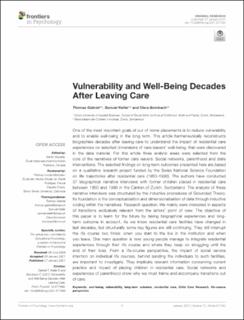Please use this identifier to cite or link to this item:
https://doi.org/10.21256/zhaw-21491Full metadata record
| DC Field | Value | Language |
|---|---|---|
| dc.contributor.author | Gabriel, Thomas | - |
| dc.contributor.author | Keller, Samuel | - |
| dc.contributor.author | Bombach, Clara | - |
| dc.date.accessioned | 2021-01-28T13:39:17Z | - |
| dc.date.available | 2021-01-28T13:39:17Z | - |
| dc.date.issued | 2021-01-27 | - |
| dc.identifier.issn | 1664-1078 | de_CH |
| dc.identifier.uri | https://digitalcollection.zhaw.ch/handle/11475/21491 | - |
| dc.description.abstract | One of the most important goals of out of home placements is to reduce vulnerability and to enable well-being in the long term. This article hermeneutically reconstructs biographies decades after leaving-care to understand the impact of residential care experiences on selected dimensions of care-leavers’ well-being, that were discovered in the data material. For this article three analytic areas were selected from the core of the narratives of former care leavers: Social networks, parenthood and state interventions. The selected findings on long-term outcomes presented here are based on a qualitative research project funded by the Swiss National Science Foundation on life trajectories after residential care (1950–1990). The authors have conducted 37 biographical narrative interviews with former children placed in residential care between 1950 and 1990 in the Canton of Zurich, Switzerland. The analysis of these narrative interviews was structured by the inductive procedures of Grounded Theory. Its foundation is the conceptualisation and dimensionalisation of data through inductive coding within the narratives. Research question: We mainly were interested in aspects of transitions exclusively relevant from the actors’ point of view. The objective of this paper is to learn for the future by taking biographical experiences and long-term outcome in account. As we know residential care facilities have changed in last decades, but structurally some key figures are still continuing. They still interrupt the life course two times: when you start to the live in the institution and when you leave. One main question is how young people manage to integrate residential experiences through their life course and where they keep on struggling until the end of their lives. From a life-course perspective, the impact of social service intention on individual life courses, behind sending the individuals to such facilities, are important to investigate. They implicate relevant information concerning current practice and impact of placing children in residential care. Social networks and experiences of parenthood show why we must frame and accompany transitions out of care. | de_CH |
| dc.language.iso | en | de_CH |
| dc.publisher | Frontiers Research Foundation | de_CH |
| dc.relation.ispartof | Frontiers in Psychology | de_CH |
| dc.rights | http://creativecommons.org/licenses/by/4.0/ | de_CH |
| dc.subject.ddc | 362.7: Jugendhilfe | de_CH |
| dc.title | Vulnerability and well-being decades after leaving care | de_CH |
| dc.type | Beitrag in wissenschaftlicher Zeitschrift | de_CH |
| dcterms.type | Text | de_CH |
| zhaw.departement | Soziale Arbeit | de_CH |
| zhaw.organisationalunit | Institut für Kindheit, Jugend und Familie (IKJF) | de_CH |
| dc.identifier.doi | 10.3389/fpsyg.2021.577450 | de_CH |
| dc.identifier.doi | 10.21256/zhaw-21491 | - |
| zhaw.funding.eu | No | de_CH |
| zhaw.issue | 577450 | de_CH |
| zhaw.originated.zhaw | Yes | de_CH |
| zhaw.publication.status | publishedVersion | de_CH |
| zhaw.volume | 12 | de_CH |
| zhaw.publication.review | Peer review (Publikation) | de_CH |
| zhaw.funding.snf | 147695 | de_CH |
| zhaw.webfeed | Kinder- und Jugendhilfe | de_CH |
| zhaw.funding.zhaw | Heimplatzierungen im Kanton Zürich zwischen 1950 und 1990 | de_CH |
| zhaw.author.additional | No | de_CH |
| zhaw.display.portrait | Yes | de_CH |
| zhaw.monitoring.costperiod | 2021 | de_CH |
| Appears in collections: | Publikationen Soziale Arbeit | |
Files in This Item:
| File | Description | Size | Format | |
|---|---|---|---|---|
| 2021_Gabriel_etal_Vulnerability-and-well-being_fpsyg.pdf | 332.31 kB | Adobe PDF |  View/Open |
Show simple item record
Gabriel, T., Keller, S., & Bombach, C. (2021). Vulnerability and well-being decades after leaving care. Frontiers in Psychology, 12(577450). https://doi.org/10.3389/fpsyg.2021.577450
Gabriel, T., Keller, S. and Bombach, C. (2021) ‘Vulnerability and well-being decades after leaving care’, Frontiers in Psychology, 12(577450). Available at: https://doi.org/10.3389/fpsyg.2021.577450.
T. Gabriel, S. Keller, and C. Bombach, “Vulnerability and well-being decades after leaving care,” Frontiers in Psychology, vol. 12, no. 577450, Jan. 2021, doi: 10.3389/fpsyg.2021.577450.
GABRIEL, Thomas, Samuel KELLER und Clara BOMBACH, 2021. Vulnerability and well-being decades after leaving care. Frontiers in Psychology. 27 Januar 2021. Bd. 12, Nr. 577450. DOI 10.3389/fpsyg.2021.577450
Gabriel, Thomas, Samuel Keller, and Clara Bombach. 2021. “Vulnerability and Well-Being Decades after Leaving Care.” Frontiers in Psychology 12 (577450). https://doi.org/10.3389/fpsyg.2021.577450.
Gabriel, Thomas, et al. “Vulnerability and Well-Being Decades after Leaving Care.” Frontiers in Psychology, vol. 12, no. 577450, Jan. 2021, https://doi.org/10.3389/fpsyg.2021.577450.
Items in DSpace are protected by copyright, with all rights reserved, unless otherwise indicated.